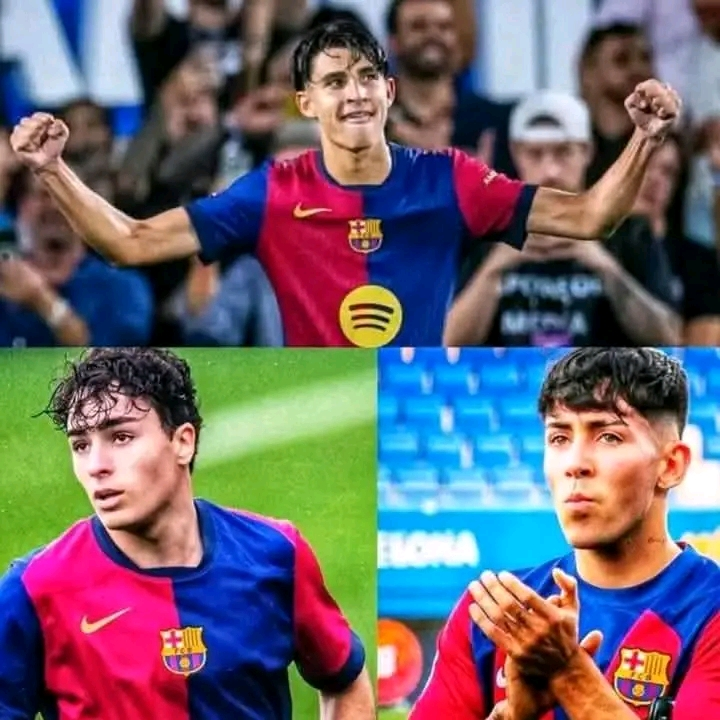As the summer transfer window edges closer, FC Barcelona finds itself once again caught between its lofty footballing ambitions and harsh financial realities. The club’s inability to compete financially with Europe’s wealthiest teams has left sporting director Deco and newly-appointed head coach Hansi Flick with no choice but to pivot—and that pivot leads straight to the heart of the club: La Masia.
While fans had hoped for the arrival of top-class wingers like Nico Williams or Luis Díaz to bolster the flanks, Barcelona’s hierarchy now admits those signings are unlikely. Both players command hefty transfer fees and wage packages—figures the Catalan giants simply cannot accommodate without breaching Financial Fair Play regulations.
Instead, the club is doubling down on its youth academy—a move that once helped build one of the greatest teams in football history. In what is now being dubbed “Barcelona’s Plan B,” Deco has identified three promising La Masia wingers who could step into the first-team setup for the 2025/26 campaign: Dani Rodríguez, Toni Fernández, and Jan Virgili.
Dani Rodríguez, the oldest and most experienced of the trio, had already made his first-team debut under Xavi earlier this year. The 18-year-old winger showed flashes of brilliance, combining slick footwork with confident attacking runs. However, his progress has been temporarily halted due to a shoulder injury that required surgery. He’s not expected to return to full training until the end of August.
Despite his current setback, Rodríguez remains a key part of Flick’s vision. Club insiders report that the German tactician is closely monitoring his recovery, believing Rodríguez could be eased into the squad once fit. His ability to stretch defenses and operate on either flank makes him a valuable asset for Flick’s high-energy attacking setup.
Alongside Rodríguez, the club is particularly excited about 16-year-old sensation Toni Fernández. Though still a teenager, Fernández is already considered one of La Masia’s brightest jewels. Coaches describe him as a technically-gifted player with exceptional vision, capable of playing not only as a winger but also centrally in a creative midfield role.
What makes Fernández stand out is his composure. At such a young age, he demonstrates tactical intelligence that often belies his age. With comparisons already being drawn to legends like Andrés Iniesta and a young Fati, Barcelona is treading carefully, determined not to rush his development while also recognizing his rare talent.
Then there’s Jan Virgili, the most prolific of the three this season. The 17-year-old has been enjoying a breakout campaign with Barça Atlètic, contributing six goals and assists in just nine matches. His playing style is electric—fast, aggressive, and unafraid to take on defenders. Virgili offers the kind of direct attacking threat that could change a game in an instant.
Flick sees Virgili as a possible “impact substitute,” someone who could thrive in the final 20 minutes of tightly contested matches. His speed and one-on-one ability can break stubborn defenses, especially when the opposition is tiring. It’s this kind of strategic depth Barcelona sorely lacked last season.
Turning to La Masia isn’t just about filling gaps—it’s about survival and revival. Barcelona’s financial situation is precarious. The club still struggles under the weight of past mismanagement, including inflated wages and debt-laden operations. Until more revenue streams open or major sales are made, signing players like Williams or Díaz remains a pipe dream.
Yet out of that financial darkness, a glimmer of optimism shines. Barcelona has always prided itself on developing its own, and now, that philosophy is no longer optional—it’s essential. With Hansi Flick at the helm, a manager renowned for tactical discipline and youth development, there’s hope that La Masia can once again feed the first team.
Unlike previous years when short-term success dictated transfer strategy, Flick and Deco are working in sync to create a long-term model rooted in sustainability. The German coach has reportedly asked for detailed reports on La Masia talents and has already attended multiple youth matches since his arrival.
Moreover, Flick’s appointment signals a break from desperation signings. He prefers a balanced, hungry squad rather than one full of big names who arrive without understanding the Barça DNA. His success with Bayern Munich’s younger players and his bold decisions with the German national team suggest he is not afraid to trust youth.
For fans, this new approach will require patience. There will be no marquee winger arriving at Camp Nou this summer. Instead, they’ll watch Rodríguez, Fernández, and Virgili step onto the big stage, perhaps nervously at first, but with a passion and pride born from growing up in the shadow of Camp Nou.
Of course, relying on youth has its risks. Mistakes will happen. Inexperience may cost the team in tight matches. But it also brings raw hunger—a willingness to fight, learn, and grow. And for Barcelona, that may be the most valuable currency of all right now.
Should even one of these youngsters cement themselves as a reliable first-team player, it could represent a turning point—not just in this season, but in the club’s long-term trajectory. It would prove that Barcelona, despite financial constraints, can still compete through philosophy, identity, and patience.
Barcelona’s Plan B, therefore, is not merely a backup—it’s a blueprint. A return to the fundamentals that once made the club admired across the globe. And in this new chapter under Hansi Flick, La Masia might just save the day again.
Would you like a featured image or a social media caption to go with the article?



